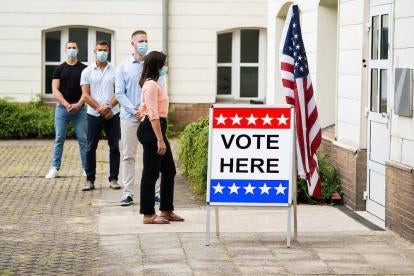Election Day is fast approaching, with November 3, 2020, being the last day to vote in the 2020 presidential election. As employees go to the polls, employers should review the voting leave laws in their applicable state. In 2020, 30 states have some form of requirement that obligates employers to give employees time off to vote. These laws vary greatly across the country. For example, some states, like California, require employers to pay for up to two hours of time off to every employee to vote. Other states, like Arkansas, simply require employers to provide an unspecified amount of time off, which is unpaid.
This year, employers are also wrestling with the implications of COVID-19. As we have previously reported, many employers have implemented remote working for their employees, and there are a number of employment law considerations applicable to a remote workforce. Voting laws are another area with specific implications for teleworking employees. Employers should note that state voting laws generally do not make exceptions for employees who work from home versus employees who work at their employer’s worksite. Accordingly, employers should continue to follow their time off policies for voting—assuming, of course, such policies are consistent with state law—and provide time off or, if required, paid time off, regardless of whether their employee is working from home or working at the employer’s worksite.
In addition to providing time off to vote, employers should keep in mind these five tips to avoid running afoul of voting leave laws:
-
Check your state’s specific leave laws. As mentioned above, state laws vary greatly as to the amount of leave an employer is required to provide and whether that time off must be paid or not. Since the last presidential election, several states, including New York, Virginia, the District of Columbia, and Puerto Rico, have updated their voting leave laws. A number of states have also implemented emergency measures to accommodate COVID-19 concerns, such as increasing capacity for mail-in voting. Employers should review their specific state requirements. If employers have employees located in multiple states, they should make sure that their leave policies accommodate every state in which their employees work.
-
Don’t tell your employees who to vote for. Some jurisdictions have specific rules that prohibit employers from influencing their employees’ votes. Even if your state does not prohibit employers from influencing employee votes, discretion is the better part of valor when it comes to politics at the office. Employers generally are better served if they do not hold captive meetings to discuss political issues, threaten employees over which political candidates or causes they support, or mandate attendance of employees at political rallies.
-
Don’t punish employees for not voting. While the coveted “I voted” sticker is a badge of honor many employees proudly wear, employers should not chastise employees who choose not to vote. First, only U.S. citizens are permitted to vote in general elections. Further, some religions prohibit voting, as it would require the person to judge a particular candidate. Criticizing an employee who does not vote may inadvertently mean you are criticizing an employee who is part of a protected class. The bottom line is - permit employees time off to vote, but do not criticize those who choose not to vote.
-
Recognize that this year will be unique. With COVID-19, voting this year will be markedly different than in years past. States that permit early voting have reported long lines at polling places and longer than average wait times due to social distancing, disinfecting, and other measures to keep voters and pollsters safe during while voting. Employers should be understanding if employees take slightly longer to vote this year given the necessary precautions polling places have to take.
-
Not allowing time off for voting could lead to public relations issues in addition to legal issues. Over the past few years, voting has become a hot-button issue for many companies. Nonpartisan groups like ElectionDay.org and Time to Vote have raised awareness of and engaged in advocacy regarding voting leave. As a result, more than 700 companies nationwide have made pledges to provide employees adequate time to vote. Some are going further than state laws require, by making Election Day a paid holiday, providing employees with early voting information, mail-in ballots, and voting locations, and giving employees paid or unpaid time off to act as polling volunteers. As these practices become more and more common, employers should recognize that not providing employees with time off could lead to a phone call with your PR representatives (in addition to your lawyer).



 i
i

